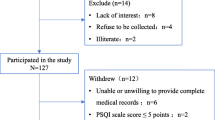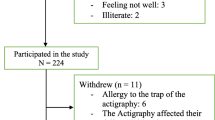Abstract
Purpose
Sleep disturbances are common in cancer patients, but little is known about preoperative insomnia and its associated factors in colorectal cancer (CRC) patients. The aim of this study was to clarify the relationship between preoperative insomnia and its associated factors (i.e., pain, anxiety, self-esteem, and coping styles) in CRC patients.
Methods
A cross-sectional study was conducted in consecutive CRC inpatients (N = 434), who were required to complete the questionnaires about insomnia, pain, anxiety, self-esteem, and coping styles (acceptance/resignation, confrontation, avoidance) before the day of surgery. Hierarchical regression analyses were conducted to explore the relationships between preoperative anxiety and its associated factors.
Results
Based on the cutoff value of Athens Insomnia Scale (scores ≥ 6) in Chinese cancer patients, the prevalence of insomnia was 38.2% before surgery. Pain (β = 0.087, p = 0.015) and anxiety (β = 0.372, p < 0.001) were positively associated with preoperative insomnia, while self-esteem (β = − 0.479, p < 0.001) and confrontation coping (β = − 0.124, p = 0.003) showed protective effects on preoperative insomnia when putting them together into hierarchical regression. The associated factors together accounted for an additional variance of preoperative insomnia (47.6%).
Conclusions
In line with previous findings, the detrimental effects of pain and anxiety on preoperative insomnia were also observed in our study. More importantly, our main new findings were that self-esteem and confrontation coping played important roles in alleviating preoperative insomnia among CRC patients. Clinicians should take these results into account when developing cancer care management to relieve preoperative insomnia.
Similar content being viewed by others
References
American Psychiatric Association (2013) Diagnostic and statistical manual of mental disorders. BMC Med 17:133–137
Induru RR, Walsh D (2014) Cancer-related insomnia. Am J Hosp Palliat Care 31:777–785
Cao XL, Wang SB, Zhong BL et al (2017) The prevalence of insomnia in the general population in China: A meta-analysis. PLoS One 12:e0170772
Peoples AR, Garland SN, Pigeon WR et al (2019) Cognitive behavioral therapy for insomnia reduces depression in cancer survivors. J Clin Sleep Med 15:129–137
Cha KM, Chung YK, Lim KY, Noh JS, Chun M, Hyun SY, Kang DR, Oh MJ, Kim NH (2017) Depression and insomnia as mediators of the relationship between distress and quality of life in cancer patients. J Affect Disord 217:260–265
Gonzalez BD, Grandner MA, Caminiti CB, Hui SA (2018) Cancer survivors in the workplace: sleep disturbance mediates the impact of cancer on healthcare expenditures and work absenteeism. Support Care Cancer 26:4049–4055
Bray F, Ferlay J, Soerjomataram I, Siegel RL, Torre LA, Jemal A (2018) Global cancer statistics 2018: GLOBOCAN estimates of incidence and mortality worldwide for 36 cancers in 185 countries. CA Cancer J Clin 68:394–424
Vonk-Klaassen SM, de Vocht HM, den Ouden MEM, Eddes EH, Schuurmans MJ (2016) Ostomy-related problems and their impact on quality of life of colorectal cancer ostomates: a systematic review. Qual Life Res 25:125–133
Jarmuż A, Zielińska M (2017) Clinical treatment in colorectal cancer: other aspects. In: Fichna J (ed) Introduction to gastrointestinal diseases. Springer, Cham, pp 145–154
Ida M, Onodera H, Yamauchi M, Kawaguchi M (2019) Preoperative sleep disruption and postoperative functional disability in lung surgery patients: a prospective observational study. J Anesth 33:501–508
Leung JM, Sands LP, Newman S, Meckler G, Xie Y, Gay C, Lee K (2015) Preoperative sleep disruption and postoperative delirium. J Clin Sleep Med 11:907–913
Xu QM, Fan LH, Zhang LB et al (2015) Effect of preoperative sleep disturbance on efficacy of postoperative analgesia and comfort in patients undergoing colorectal cancer resection surgery. Chin J Prim Med Pharm 22:481–483 (in China)
Halle IH, Westgaard TK, Wahba A, Oksholm T, Rustøen T, Gjeilo KH (2017) Trajectory of sleep disturbances in patients undergoing lung cancer surgery: a prospective study. Interact Cardiovasc Thorac Surg 25:285–291
Irwin MR (2013) Depression and insomnia in cancer: prevalence, risk factors, and effects on cancer outcomes. Curr Psychiatry Rep 15:404
Theobald DE (2004) Cancer pain, fatigue, distress, and insomnia in cancer patients. Clin Cornerstone 6:S15–S21
Loh KP, Zittel J, Kadambi S, Pandya C, Xu H, Flannery M, Magnuson A, Bautista J, McHugh C, Mustian K, Dale W, Duberstein P, Mohile SG (2018) Elucidating the associations between sleep disturbance and depression, fatigue, and pain in older adults with cancer. J Geriatr Oncol 9:464–468
Maguire R, Drummond FJ, Hanly P, Gavin A, Sharp L (2019) Problems sleeping with prostate cancer: exploring possible risk factors for sleep disturbance in a population-based sample of survivors. Support Care Cancer 27:3365–3373. https://doi.org/10.1007/s00520-018-4633-z
Galiano-Castillo N, Arroyo-Morales M, Ariza-Garcia A, Fernández-Lao C, Fernández-Fernández AJ, Cantarero-Villanueva I (2017) Factors that explain the cancer-related insomnia. Breast J 23:387–394
Ho RTH, Fong TCT, Chan CKP, Chan CL (2013) The associations between diurnal cortisol patterns, self-perceived social support, and sleep behavior in Chinese breast cancer patients. Psychoneuroendocrinology 38:2337–2342
Blascovich J, Tomaka J (1991) Measures of self-esteem. In: Robinson JP, Shaver PR, Wrightsman LS (eds) Measures of personality and social psychological attitudes. Academic Press, San Diego, pp 115–160
Yang Y, Sun G, Dong X, Zhang HJ, Xing CZ, Liu Y (2019) Preoperative anxiety in Chinese colorectal cancer patients: the role of social support, self-esteem and coping styles. J Psychosom Res 121:81–87
Katz MR, Rodin G, Devins GM (1995) Self-esteem and cancer: theory and research. Can J Psychiatr 40:608–615
Monat A, Lazarus R (1984) Stress and coping: an anthology. Columbia University Press, New York, NY
Thomas KMS, Bower J, Hoyt MA, Sepah S (2010) Disrupted sleep in breast and prostate cancer patients undergoing radiation therapy: the role of coping processes. Psychooncology 19:767–776
Lee MS, Asvat Y, Gonzalez BD, Jacobsen PB, Jim HS (2017) Coping, stress, and insomnia in hematopoietic stem cell transplant candidates. Psychooncology 26:560–562
Hoyt MA, Thomas KMS, Epstein DR, Dirksen SR (2009) Coping style and sleep quality in men with cancer. Ann Behav Med 37:88–93
Soldatos CR, Dikeos DG, Paparrigopoulos TJ (2000) Athens Insomnia Scale: validation of an instrument based on ICD-10 criteria. J Psychosom Res 48:555–560
Wang Y, Zhu X, Li L, Yi J, He J (2016) What factors affect the insomnia symptom trajectories in women with nonmetastatic breast cancer? J Pain Symptom Manag 52:850–858
Sun JL, Chiou JF, Lin CC (2011) Validation of the Taiwanese version of the Athens Insomnia Scale and assessment of insomnia in Taiwanese cancer patients. J Pain Symptom Manag 41:904–914
Wong DL, Hockenberry-Eaton M, Wilson D et al (1996) Wong-Baker faces pain rating scale. Home Health Focus 2:62
Hamilton MAX (1959) The assessment of anxiety states by rating. Br J Med Psychol 32:50–55
Feifel H, Strack S, Nagy VT (1987) Coping strategies and associated features of medically ill patients. Psychosom Med 49:616–625
Tang GX, Yan PP, Yan CL, Fu B, Zhu SJ, Zhou LQ, Huang X, Wang Y, Lei J (2016) Determinants of suicidal ideation in gynecological cancer patients. Psychooncology 25:97–103
Hyphantis T, Goulia P, Zerdes I, Solomou S, Andreoulakis E, Carvalho AF, Pavlidis N (2016) Sense of coherence and defense style predict sleep difficulties in early non-metastatic colorectal cancer. Dig Dis Sci 61:273–282
Chen Y, Wang L (2018) Relationship between cancer related fatigue, sleep disorder and quality of life in elderly patients with advanced lung cancer. Chin Nurs Res 32:1935–1938 (in China)
Ren Y, Li S, Zhou S et al (2019) Optimism outweighs neuroticism and anxiety sensitivity to predict insomnia symptoms in women after surgery for breast cancer. Support Care Cancer 27:2903–2909
Klemann N, Hansen MV, Gögenur I (2015) Factors affecting post-operative sleep in patients undergoing colorectal surgery-a systematic review. Dan Med J 62:A5053
Choueiry N, Salamoun T, Jabbour H, El Osta N, Hajj A, Rabbaa Khabbaz L (2016) Insomnia and relationship with anxiety in university students: a cross-sectional designed study. PLoS One 11:e0149643
Huang CLC, Weng SF, Wang JJ, Hsu YW, Wu MP (2015) Risks of treated insomnia, anxiety, and depression in health care-seeking physicians: a nationwide population-based study. Medicine 94:e1323
Schraml K, Perski A, Grossi G, Simonsson-Sarnecki M (2011) Stress symptoms among adolescents: the role of subjective psychosocial conditions, lifestyle, and self-esteem. J Adolesc 34:987–996
Lemola S, Räikkönen K, Gomez V, Allemand M (2013) Optimism and self-esteem are related to sleep. Results from a large community-based sample. Int J Behav Med 20:567–571
Harvey CJ, Gehrman P, Espie CA (2014) Who is predisposed to insomnia: a review of familial aggregation, stress-reactivity, personality and coping style. Sleep Med Rev 18:237–247
Lazarus RS, Folkman S (1984) Stress, appraisal, and coping. Springer, New York, NY
Rodrigue JR, Jackson SI, Perri MG (2000) Medical coping modes questionnaire: factor structure for adult transplant candidates. Int J Behav Med 7:89–110
Acknowledgments
The authors would like to thank all the staffs who contributed to this study.
Funding
This work was supported by grants from the National Natural Science Foundation of China (Project No.: 81472853) and Basic Research Projects of the Higher Education Department of Liaoning Province (Project No.: LQNK201732).
Author information
Authors and Affiliations
Corresponding authors
Ethics declarations
Ethical approval
The study design was approved by the Committee on Human Experimentation of China Medical University and complied with the 1964 Helsinki Declaration and its later amendments.
Informed consent
Patients were well informed about the purpose and contents of our study by investigators. Written informed consent was obtained from all inpatients included in this study.
Conflict of interest
The authors declare that they have no conflict of interest.
Additional information
Publisher’s note
Springer Nature remains neutral with regard to jurisdictional claims in published maps and institutional affiliations.
Rights and permissions
About this article
Cite this article
Sun, GW., Yang, YL., Yang, XB. et al. Preoperative insomnia and its association with psychological factors, pain and anxiety in Chinese colorectal cancer patients. Support Care Cancer 28, 2911–2919 (2020). https://doi.org/10.1007/s00520-019-05151-y
Received:
Accepted:
Published:
Issue Date:
DOI: https://doi.org/10.1007/s00520-019-05151-y




